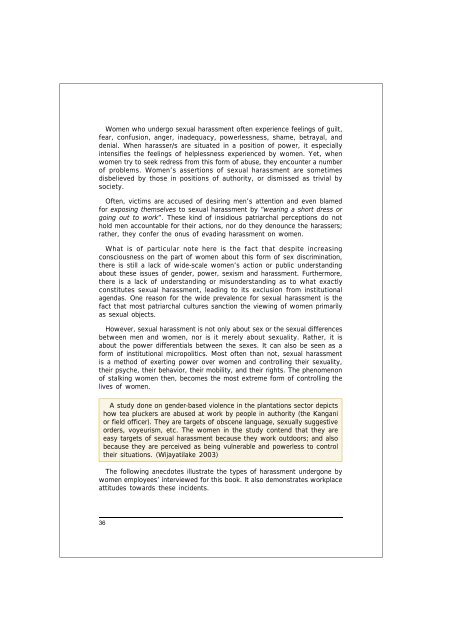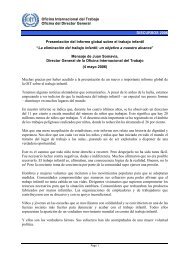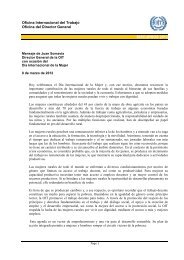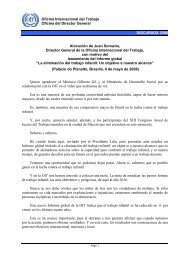Beyond Glass Ceilings and Brick Walls - International Labour ...
Beyond Glass Ceilings and Brick Walls - International Labour ...
Beyond Glass Ceilings and Brick Walls - International Labour ...
Create successful ePaper yourself
Turn your PDF publications into a flip-book with our unique Google optimized e-Paper software.
Women who undergo sexual harassment often experience feelings of guilt,<br />
fear, confusion, anger, inadequacy, powerlessness, shame, betrayal, <strong>and</strong><br />
denial. When harasser/s are situated in a position of power, it especially<br />
intensifies the feelings of helplessness experienced by women. Yet, when<br />
women try to seek redress from this form of abuse, they encounter a number<br />
of problems. Women’s assertions of sexual harassment are sometimes<br />
disbelieved by those in positions of authority, or dismissed as trivial by<br />
society.<br />
Often, victims are accused of desiring men’s attention <strong>and</strong> even blamed<br />
for exposing themselves to sexual harassment by “wearing a short dress or<br />
going out to work”. These kind of insidious patriarchal perceptions do not<br />
hold men accountable for their actions, nor do they denounce the harassers;<br />
rather, they confer the onus of evading harassment on women.<br />
What is of particular note here is the fact that despite increasing<br />
consciousness on the part of women about this form of sex discrimination,<br />
there is still a lack of wide-scale women’s action or public underst<strong>and</strong>ing<br />
about these issues of gender, power, sexism <strong>and</strong> harassment. Furthermore,<br />
there is a lack of underst<strong>and</strong>ing or misunderst<strong>and</strong>ing as to what exactly<br />
constitutes sexual harassment, leading to its exclusion from institutional<br />
agendas. One reason for the wide prevalence for sexual harassment is the<br />
fact that most patriarchal cultures sanction the viewing of women primarily<br />
as sexual objects.<br />
However, sexual harassment is not only about sex or the sexual differences<br />
between men <strong>and</strong> women, nor is it merely about sexuality. Rather, it is<br />
about the power differentials between the sexes. It can also be seen as a<br />
form of institutional micropolitics. Most often than not, sexual harassment<br />
is a method of exerting power over women <strong>and</strong> controlling their sexuality,<br />
their psyche, their behavior, their mobility, <strong>and</strong> their rights. The phenomenon<br />
of stalking women then, becomes the most extreme form of controlling the<br />
lives of women.<br />
A study done on gender-based violence in the plantations sector depicts<br />
how tea pluckers are abused at work by people in authority (the Kangani<br />
or field officer). They are targets of obscene language, sexually suggestive<br />
orders, voyeurism, etc. The women in the study contend that they are<br />
easy targets of sexual harassment because they work outdoors; <strong>and</strong> also<br />
because they are perceived as being vulnerable <strong>and</strong> powerless to control<br />
their situations. (Wijayatilake 2003)<br />
The following anecdotes illustrate the types of harassment undergone by<br />
women employees’ interviewed for this book. It also demonstrates workplace<br />
attitudes towards these incidents.<br />
36
















